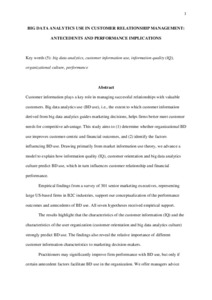Big Data Analytics Use in Customer Relationship Management: Antecedents and Performance Implications (Esitys The 24th international colloquium on Relationship Marketing -konferenssissa, 6.-9. 2016 Toulouse, France)
Lars Meyer-Waarden; Andreas Munzel; Samppa Suoniemi
https://urn.fi/URN:NBN:fi-fe2021042716324
Tiivistelmä
Customer information plays a key
role in managing successful relationships with valuable customers. Big data
analytics use (BD use), i.e., the extent to which customer information derived
from big data analytics guides marketing decisions, helps firms better meet
customer needs for competitive advantage. This study aims to (1) determine
whether organizational BD use improves customer-centric and financial outcomes,
and (2) identify the factors influencing BD use. Drawing primarily from market
information use theory, we advance a model to explain how information quality (IQ),
customer orientation and big data analytics culture predict BD use, which in
turn influences customer relationship and financial performance.
Empirical
findings from a survey of 301 senior marketing executives, representing large
US-based firms in B2C industries, support our conceptualization of the
performance outcomes and antecedents of BD use. All seven hypotheses received
empirical support.
The
results highlight that the characteristics of the customer information (IQ) and
the characteristics of the user organization (customer orientation and big data
analytics culture) strongly predict BD use. The findings also reveal the
relative importance of different customer information characteristics to
marketing decision-makers.
Practitioners
may significantly improve firm performance with BD use, but only if certain antecedent
factors facilitate BD use in the organization. We offer managers advice how to
overcome challenges specific to BD use by managing the quality aspects of
customer information, and by fostering shared customer-oriented and
analytics-oriented cultures.
Kokoelmat
- Rinnakkaistallenteet [19218]
